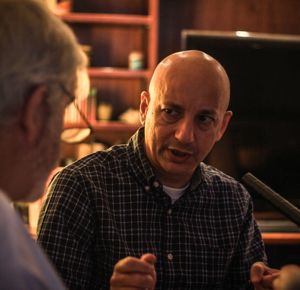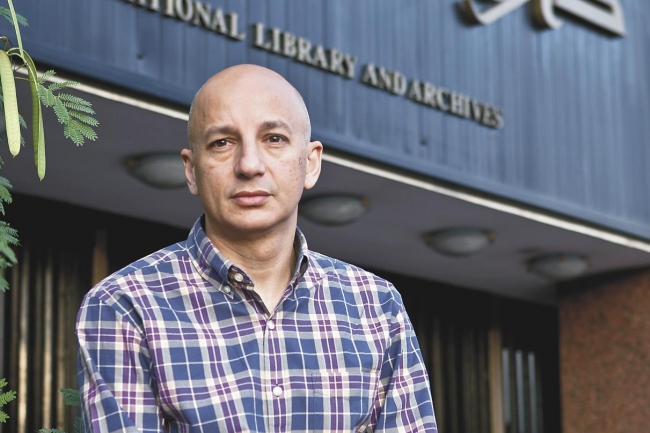A short interview with Magdi Abdelhadi of the BBC World Service on the history of Egyptian monasticism and how the history of the Coptic church is taught (or not) in Egyptian schools. (at 23:15)
Leave a CommentCategory: Media appearances
A radio interview with Chris Lydon of Radio Opensource on the historical meaning of the January 25, 2011 Revolution. Recorded in Cairo on November 14, 2012 CAIRO — Khaled Fahmy came home to Egypt just months before the uprising in Tahrir Square. He was leaving a big university career in Oxford and New York, drawn by intuition and maybe destiny to be the historian of a great event. In an hour’s conversation he will recharge your sense of the Arab Revolution of 2011. It was just what we half-guessed at the time: a watershed more cultural and psycho-social than it was political. It…
Leave a CommentPublished in The Cairo Review of Global Affairs on September 4, 2012 A TV show recently invited me to talk about the history of Egyptian constitutions, and the lessons we can draw from this history in our efforts to draft a new constitution. I was immediately struck by how little I knew. We were taught nothing about our constitutional rights in civics classes in school, and our history classes stressed the victories of our nation rather than our rights as citizens. So, I have been struggling to catch up. I learned from a colleague, for example, that the so-called liberal…
Leave a CommentAn article by Ursula Lindsey published in the Chronicle of Higher Education on June 12, 2012 Group hopes to encourage inquiry with an open archive of the revolution THE EGYPTIANS who poured into the streets of their cities early this year were well aware that they were making history. “In 10 years, when I see my children studying Egyptian history, I want to say: ‘I was there,’” Ahmad, a young demonstrator on his way into Tahrir Square, told me on February 4, a week before President Hosni Mubarak was driven from office. Egypt is still living through its revolution, and…
Leave a CommentAn interview with Edward Stourton of the BBC 18 months after the outbreak of the Revolution (my interventions are at 1:46, 3:36, 5:58 and 25:43). Another link is here. Edward Stourton explores the prospects for post-revolution government, following the Arab Spring. Elections are being held, but can voters be sure autocratic rule is in the past? Contributors, in order of appearance: Aref Ali Nayed, Islamic theologian and Libyan ambassador to the United Arab Emirates. Khaled Fahmy, professor of history at the American University in Cairo. Marina Ottaway, senior associate of the Middle East programme at the Carnegie Endowment for International…
Leave a CommentAn interview with Julian Worricker, Kate Adie and Baria Alamuddin on the BBC’s World Today program discussing the results of the first round of the presidential elections in May 2012. At issue is the fear of the impact of a Muslim Brotherhood’s victory on women’s rights; role of Saudi Arabia in the Egyptian political system and the larger question of the role of political Islam in Egypt. (at 36:50) http://www.bbc.co.uk/programmes/p00s4728
Leave a CommentAn interview with Edward Stourton on the BBC Radio 4 on what it meant to grow up by the Nile in Cairo. This is the second of three parts by Stourton on Egypt. The first bit (on Aswan) and the third (on the Delta) parts are every bit as interesting.
Leave a CommentAn interview with the BBC Radio 4 The World Today program one day after the Port Said Massacre in which 72 people were killed. (Egypt part starts at 07:34 and my contribution starts at 12:39.) This video clearly shows the police forces on the pitch standing idly doing nothing to control the crows.
Leave a CommentAired on Jazeera English on December 8, 2011. http://www.youtube.com/watch?v=IbPibuTu_m0
Leave a CommentAn article by Mohammed Shoair published in al-Akhbar on November 7, 2011. After twenty years of teaching around the world, historian Khaled Fahmy decided to disregard advice from friends and colleagues and return to Cairo to watch as history itself unfolds in the lives and acts of ordinary people. At a time when a succession of power was anticipated, accompanied by an intensification of state repression, many advised historian Khaled Fahmy to re-evaluate his decision to return to Egypt. Nevertheless, the esteemed scholar had an alternative view. “There is something different happening in Egypt right now,” he says. “I felt…
Leave a Comment





